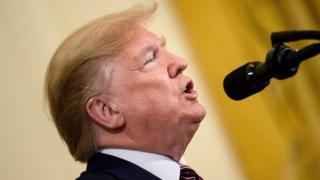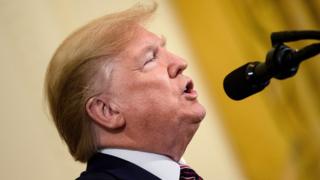Trump ‘signs off’ on deal to pause US-China trade war
Asia stocks rose after the two sides reportedly reached a deal days before new tariffs were due to start. …

 Image copyright AFP/Getty Images
Image copyright AFP/Getty Images Asian stock markets rose on Friday as the US and China moved close to signing a trade deal to avert a new round of tariffs.
The deal could be announced later in the day, after US President Donald Trump reportedly signed off on the terms.
Washington is said to have agreed to remove some tariffs, while Beijing would boost purchases of US farm goods.
However, many of the more difficult issues are still to be addressed.
In early trading, Japan’s Nikkei 225 rose 2.2% while Hong Kong’s Hang Seng was up 1.9%.
Earlier, optimism surrounding a trade deal pushed US markets higher, with the S&P 500 and the Nasdaq closing at fresh record highs.
“It’s a good starting point,” Chamber of Commerce head of international affairs Myron Brilliant told broadcaster CNBC after meeting with White House officials.
A deal would deliver a victory to Mr Trump, who is under political pressure, with debate on his impeachment underway in the US Congress.
He tweeted earlier on Thursday that the US and China were “very” close to an agreement.
“They want it and so do we!” he wrote.
Previous truces have collapsed and without a formal announcement or presentation of a written agreement, many remained wary. The hints of progress on Thursday still sent the main US stock indexes up about 1%.
The US reportedly offered to halve tariff rates on about $350bn (£260bn) worth of Chinese goods, some of which had climbed as high as 25%.
However, the deal is not expected to address many of the more difficult issues that triggered the fight, like China’s subsidies for certain industries.
As described, the potential agreement falls short of what the US initially said were its goals, said Jennifer Hillman, a senior fellow at the Council on Foreign Relations and a former trade official.
“This should NOT be described as a trade agreement,” she wrote on Twitter.
“It is a purchase and sale agreement that does virtually nothing to address substantive concerns of US (+rest of the world) with China’s trade practices.”
Mr Trump has repeatedly declared progress toward a deal that would end the trade war, which has seen tariffs imposed on more than $450bn worth of US-China trade and weighed on the global economy.
In October, he announced that the two sides had agreed to terms for a “Phase One” deal, but negotiations dragged on.
Without progress, the US had threatened to impose tariffs on more than $150bn worth of Chinese exports on 15 December.
Unlike earlier rounds of tariffs, this one was slated to fall largely on everyday items, including smartphones, children’s books, footwear and clothing, heightening the economic stakes, since the US economy is driven by consumer spending.
Goldman Sachs analysts estimated that US economic growth could be 0.4% lower next year, without some sort of deal to avoid the next tariffs and roll back some of those already in place.
White House officials have downplayed the risks, arguing the tariffs are aimed at making China give up “unfair” trade practices, such as alleged intellectual property theft.



